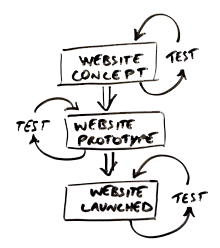Why you need to challenge your business assumptions

It is easy to get trapped in the rut of “market of one” thinking (if I like this every one else should). To mitigate this thinking our team regularly takes one of our websites and submits it to a user testing group. This group is tasked to answer questions such as describing the purpose of the site, finding a product, requesting a quote, finding the warranty on a product; typical tasks we want our customers to be able to do easily on our website. Of course (us) the people who designed the site know how to do all of these tasks easily, but what about a first time user? That is what we want to know.
The testing results have been illuminating. The most striking example was on our trailer site for the question request a quote. The team had designed request a quote as a big red button along the right hand side of the web page. As we watched the videos of the testing we were amazed that the first time user could not find the button, we dismissed this as an anomaly, but the next user had the same problem and the next user as well. In fact 60% of the users had an issue finding what to us was a clear easy to see/find button. To be honest we still do not know why most users were not able to see the button. (they all had no problem getting to the page with the button on it but could not “see” the button).
Our theory is that having the button along the right hand side of the page, grouped with “other products you may like”, in the same color as this grouping, red; made the users block out this side of the page much like a lot of users are blocking out ads which are typically on the right hand side of a webpage. Concluding this we moved the button and changed the color to green (for go!). Request a quote submissions went up.
The point of this story is that through testing you can challenge your assumptions. If we assumed because we were receiving a high number of requests for quotes that there was no room for improvement (which we did assume as we were receiving a high number of request for a quote) we would not have discovered a gap of 60% for our potential future customers. Sixty percent! That is a huge number! This example reminded us that if you are not prepared to be wrong then you can never really improve or innovate.
Taking this one step further think about yourself and other areas of your business. Why not challenge thinking on processes you have across the spectrum of your work and personal life all the time.
For most people the problem is where to start? I believe if you are truly seeking to make an organizational improvement you need to start by reviewing your culture. Use your organizations values a baseline.
At Flaman Group of companies it is easy for us. We have three core values from which everything flows: Customer Responsibility, Achievement of Goals, Making things better. I continually stop and reflect on a current process or a recently completed action and test against our values (or challenge our assumptions).
Have I followed up on tasks I am responsible for? Have I communicated expectations blindingly clear by saying what, when and how I am going to get a task accomplished? Am I creating a friendly atmosphere for our customers (internally and externally)? With every action that I do during a day, it is an opportunity to reflect and look for improvement.
I truly believe we can all rise to become a better version of ourselves, the first step is to challenge our assumptions about why we do what we do, be it processes, communication, our values and to be prepared to be wrong.
Steve Whittington is President of Roadmap Agency Inc. He has also served for over a decade as a member of the Executive Team of Flaman Group of Companies an award-winning organization and has over 25 years of executive experience. Steve’s current board work includes serving as; President of Glenora Child Care Society; and Co-Chair of the Marketing Program Advisory Committee for NAIT’s JR Shaw School of Business. Previous notable board work included, Chair of the board for Flaman Fitness Canada, a national retailer, a Director for a meal prep internet Startup Mealife and Chair of Lethbridge Housing authority, the third-largest Social housing NGO in Alberta.
Academically, Steve was an instructor of Project Management at Lethbridge College for seven years. Steve holds a Bachelor of Commerce Honours degree; he is a Certified Sales Professional (CSP), Project Management Professional (PMP), Certified Marketing Specialist (CMS) and (CCXP) Certified Customer Experience Professional.
Steve’s first book Thriving in the Customer Age – 8 Key Metrics to Transform your Business Results teaches about the customer journey and provides a guiding framework spanning all stages of the customer experience. The book explains how every metric impacts an organization and how leaders can best utilize each metric to provide a stellar customer experience. Everyone knows the customer is the most important part of a business. This book provides the tools to improve an organization’s customer experience and drastically transform business results.
Recently Steve’s Blog has been profiled as one of the Top 75 Customer Experience blogs
